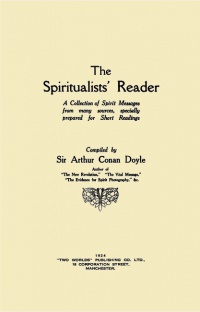The Spiritualists' Reader

The Spiritualists' Reader is a book collecting several texts about spiritualism published in march 1924 by Two Worlds Publishing Co. Ltd., compiled and prefaced by Arthur Conan Doyle.
Preface by Arthur Conan Doyle



It has seemed incongruous to many Spiritualists that in our services we make so little use of the glorious communications from the other side, We have a literature which is unapproached by that of any other religion or philosophy in the world, and we do not take adequate advantage of it. It has been my pleasant task, therefore, to snake a series of extracts from some of my favourite spiritual books in the hope that they may be useful to those who have to conduct services and who have not the time or opportunity to make a selection for themselves.
I have not arranged the quotations under then separate headings in a large way, but each bears its own description, and by consulting the index a reader who wishes to treat any particular phase of our knowledge can easily find his material. Such a reading should, in my opinion, form an integral part of every Spiritualist gathering, so tint our people may be accustomed to hearing the wisdom and the beauty of the utterances from beyond.
It is very essential, however, that it should be well read, and good reading is a rare accomplishment. If the officiating minister has not got it he should find some one in his congregation who has, and he should confide the task to him. Many good earnest clergymen ruin their own efforts by the unnatural voice which they adopt, which is enough to spoil by its artificiality the effect of the most beautiful passages. Simplicity and audibility are the two essentials for good reading.
In dealing with spirit utterances we do not, of course, ascribe infallibility to them, especially when they deal with matters of speculation. Spirits are finite like ourselves, and the higher will often intervene to correct the views of the lower. At the same time, though the contents of this book are merely like a few heads of grain picked from a vast field. in order to show the richness of the harvest, the reader cannot fail to be struck by the high level of the messages and by their remarkable agreement in essentials, although they are drawn from so many sources.
We can never expect absolute unanimity. People have their own point of view there as here. A narrow man is not instantly converted to breadth of view by the fact of death. On such debated subjects as reincarnation or the Godhead of Christ there is as sharp a division there as here. Human death is only one forward step in the illimitable march of the spirit, and it is still faced by a horizon which shrouds many mysteries. We must train our own spirits to be tolerant and charitable, realising that many of the woes of mankind, and much of the religious confusion have been caused by those who attempted to define that which was beyond human comprehension. Whether Christ was a man-like God or a God-like man, or whether there are three persons or one in God, is a mere matter of speculation which has nothing vital in it. It is probable that the world would have been none the worse had such questions never been raised. On the other hand, it is essential that we should strive for the spirit of the Sermon on the Mount, and that we should remember the words of Micah, "What doth the Lord require of thee but to do justly, love mercy, and walk humbly with thy God?"
In dealing with occasional discrepancies in spirit utterances we have also to remember that from the misery of the lowest purgatorial spheres to the glories of the seventh heaven, there is a long ladder of evolution, and that every rung of it is different from the last. The nearer the earth the more material the condition, and the experience of a lower spirit is naturally very different from that of a high one. If earth experiences were Professor by a Hindoo peasant and by an Oxford Professor they would read very differently, and yet each would represent a truth. I pray, then, that this little book may carry out that for which it was designed, and I give my thanks (and my apologies) to the many mediums whose messages I have purloined.
ARTHUR CONAN DOYLE.
Crowborough,
- October, 1923.